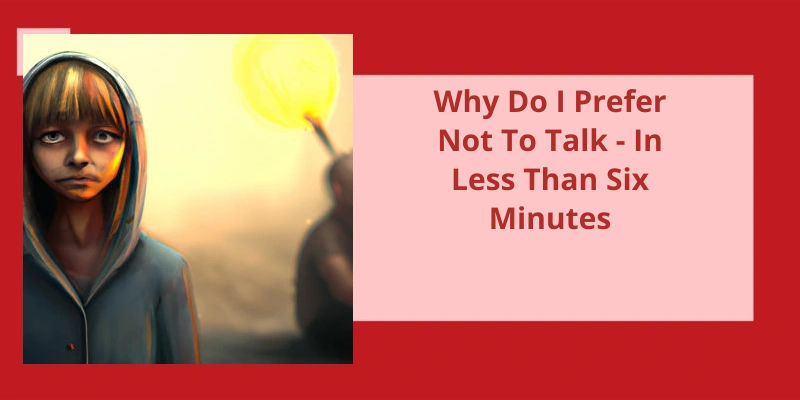In a world filled with constant communication, it can be difficult to understand why some individuals prefer not to engage in verbal conversation. The notion of remaining silent, particularly for an extended period, may seem perplexing to many who thrive on social interactions. However, for those who choose not to talk, the reasons behind their preference can vary significantly. From introversion and introspection to a desire for self-reflection and solitude, delving into the intricate reasons behind this inclination may shed light on the benefits of embracing silence. In this blog post, we will explore the multifaceted nature of choosing not to talk, aiming to uncover the underlying motivations and potential advantages of this less-than-six-minute silence.
Why Does Small Talk Give Me Anxiety?
Bringing up certain topics. For many people, small talk can feel superficial and meaningless, lacking depth and genuine connection. Engaging in small talk requires navigating social norms and expectations, which can be overwhelming for those who struggle with social anxiety.
The fear of running out of things to say can be a significant source of anxiety during small talk. It can feel like a race against time, constantly seeking new topics or interesting anecdotes to keep the conversation going. This pressure to keep the conversation flowing smoothly can cause stress and discomfort, ultimately turning a simple interaction into a distressing experience.
Opening up about personal thoughts or feelings in a casual conversation can be daunting. There’s a risk of being judged or misunderstood, which can trigger feelings of anxiety and self-consciousness. Avoiding small talk allows individuals to avoid these potential moments of vulnerability and protect their emotional well-being.
Additionally, getting stuck in a conversation without knowing how to eventually end it can be a major concern. The uncertainty of when and how to politely exit a conversation can cause individuals to prefer avoiding small talk altogether.
Lastly, the fear of offending others by Bringing up certain topics adds to the anxiety surrounding small talk. Different people have different sensitivities and boundaries, and without knowing someone well enough, it becomes challenging to navigate these potential conversational landmines. Fear of unintentionally saying something inappropriate or offensive can contribute to the preference of avoiding small talk entirely.
It requires mental and emotional energy to engage in conversation, and there are times when you simply don’t have the capacity to do so. Saying “I don’t want to talk” can be a way to preserve your own energy and prioritize your own needs.
What Does I Don’t Want to Talk Mean?
What does “I don’t want to talk” mean? Well, it’s a simple statement that expresses a desire or preference not to engage in conversation. It’s about choosing to remain silent, to keep your thoughts to yourself. Sometimes, it’s just not worth it to share your thoughts, to vocalize your opinions. You might feel like your words won’t make a difference or won’t be valued by others. And thats okay.
There are times when youre just not in the mood to make conversation. Maybe youre feeling tired, overwhelmed, or simply preoccupied with your own thoughts. In those moments, talking feels like a burden, an additional task that requires effort and energy you don’t have to spare. It’s not that you don’t care about the person youre speaking to, but rather that you need some time and space to recharge, to regroup.
Sometimes, silence is the best answer. Not every situation requires words to be resolved or understood. Sometimes, remaining silent allows others to reflect and process their own thoughts. It gives them the opportunity to take the lead in the conversation or to simply enjoy a moment of uninterrupted quiet. By not talking, you can show respect for the space and needs of others, allowing them to speak or remain silent as they choose.
As somebody who doesn’t really talk much, Id say that talking is rather exhausting. Constantly engaging in conversation requires mental and emotional energy that not everyone possesses in abundance. It can be draining to constantly monitor your words, analyze your responses, and maintain an engaging dialogue. For those who prefer not to talk, silence can be a sanctuary, a refuge from the demands of social interaction.
In a world that often prioritizes extroverted behavior and places value on the ability to articulate thoughts and ideas, it’s important to remember that not everyone operates in the same way. Some people find solace in silence, in observing and listening rather than speaking. It’s not a sign of indifference or rudeness, but rather a personal preference and a way of preserving ones own well-being.
So, the next time you come across someone who says, “I don’t want to talk,” try not to take it personally. Respect their need for silence, for introspection, and for self-care. Understand that sometimes, the best response is no response at all.
How to Navigate Social Situations When You Prefer Not to Talk
- Pay attention to non-verbal cues
- Use body language to communicate your preferences
- Find a quiet corner or secluded spot to retreat to
- Engage in activities that don’t require much talking, such as reading or drawing
- Utilize online communication methods, such as texting or messaging
- Be honest and explain your preference for less talking to those you trust
- Practice active listening to show others that you’re still engaged
- Take breaks if social situations become overwhelming
- Seek support from like-minded individuals
- Remember that it’s okay to have different preferences in social situations
Many people often question themselves when they find it uncomfortable or undesired to engage in conversations, wondering whether they’re considered weird or abnormal. The truth is, there may be a simple explanation: introversion. Being an introvert is perfectly normal and can manifest in a preference for solitude or limited social interactions. It isn’t necessarily indicative of lacking communication skills or being afraid to talk; rather, it’s a conscious choice to prioritize personal space and quiet contemplation over constant engagement.
Am I Weird for Not Wanting to Talk?
Am I weird for not wanting to talk? Is this normal? The truth is, theres nothing weird or abnormal about not wanting to engage in excessive communication. Each person has their own preferences and comfort levels when it comes to social interaction. If you find yourself leaning towards silence and solitude, you may be an introvert, which is perfectly normal.
Introversion is a personality trait characterized by a preference for reflection, solitude, and non-stimulating environments. It doesn’t mean introverts lack the skills to communicate or are afraid to do so. Instead, they simply choose not to engage in conversations unless necessary. They typically find solace in quiet settings and feel mentally drained by excessive social interaction.
There are various reasons why someone might prefer not to talk. Some introverts may find small talk draining and superficial, preferring deeper, meaningful conversations instead. Others may be more reflective and inclined to observe their surroundings rather than actively participating in discussions. It’s important to remember that these preferences arent strange or bizarre; theyre just different from those of extroverts, who typically thrive on social interaction.
Embracing your inclination for silence and introspection can be empowering. Understand that it’s completely okay to value your alone time and prioritize self-reflection. However, it’s important to strike a balance between solitude and necessary social communication. While talking may not be your default mode, learning to effectively communicate when needed can be beneficial in various aspects of life.
Additionally, cultural background and communication style can also play a role in someone’s level of talkativeness. In certain cultures, it may be more common to listen actively and speak sparingly. Moreover, personal preferences and experiences might contribute to a preference for silence or a reluctance to engage in lengthy conversations. Whatever the reason, it’s important to remember that not everyone feels the need to fill the air with constant chatter, and that’s perfectly okay.
Why I Don’t Want to Talk Much?
Why do some people prefer not to talk much? There are various possibilities to consider. One common reason is shyness or social anxiety. For individuals who feel nervous or self-conscious in social situations, speaking up and participating in conversations can be challenging. The fear of being judged or saying something wrong can lead to a preference for staying quiet and avoiding interaction.
Moreover, the preference for not talking much can also stem from a desire to listen and observe more. Some individuals may find that they gain a deeper understanding of others and the world around them by being attentive listeners rather than active speakers. By reducing their own verbal output, they can focus more on absorbing information and analyzing their surroundings.
Additionally, past negative experiences or trauma can also influence a persons desire to remain quiet. Previous instances of being interrupted, disregarded, or dismissed in conversations can lead to a fear of speaking up and expressing oneself fully. The fear of being misunderstood or not taken seriously can act as a barrier to engaging in extensive verbal communication.
It’s crucial to note that everyones preference for talking varies, and there’s no right or wrong way to communicate. Some individuals may choose to communicate primarily through non-verbal means, such as body language, facial expressions, or written communication. Others may feel more comfortable expressing themselves through art, music, or other creative outlets.
Shyness, social anxiety, personality traits like introversion, a desire to listen and observe, past negative experiences, and alternative communication methods are just a few potential factors at play. Understanding and respecting each individuals preferences is important in fostering a supportive and inclusive communication environment.
However, it’s worth considering that there may be drawbacks to completely disliking and avoiding small talk. Apart from potentially missing out on meaningful social interactions, research has shown that engaging in more frequent small talk, even for those who identify as introverts, can actually contribute to greater happiness. This suggests that dismissing small talk entirely may not be the most beneficial approach for fostering positive social connections.
Is It Bad to Dislike Small Talk?
Is it really bad to dislike small talk? Some would argue that it is. After all, small talk is often seen as the lubricant that greases the wheels of social interaction. By avoiding small talk, you may inadvertently be cutting yourself off from meaningful conversations and connections. It can be a bummer to miss out on these opportunities.
Research has shown that engaging in more frequent small talk, even for those who identify as introverts, can actually increase happiness levels. It seems that these seemingly mundane conversations can have a positive impact on our overall well-being. Perhaps small talk serves as a gateway to deeper connections, allowing us to navigate through the superficial layers and discover common ground with others.
Despite the potential drawbacks of avoiding small talk, it’s essential to remember that everyone has different social preferences and needs. Ultimately, it’s about finding a balance that works for you, where you can engage in small talk when necessary, but also prioritize the deeper connections that bring you the most joy and fulfillment.
Strategies for Navigating Small Talk for Those Who Dislike It
For individuals who dislike small talk, navigating social situations can be challenging. However, there are several strategies that can help make these interactions more manageable.
Firstly, it can be helpful to have a few go-to topics or questions in mind that can guide the conversation. These can include current events, hobbies, or shared interests. By having predetermined conversation starters, it takes away the pressure of thinking on the spot.
Secondly, it’s important to actively listen and show genuine interest in the other person’s responses. By doing so, it creates a more engaging conversation and helps to establish a connection with the other person.
Another strategy is to focus on open-ended questions rather than closed-ended ones. Open-ended questions encourage the other person to elaborate and share more of their thoughts and experiences, leading to a more meaningful conversation.
Additionally, when in social situations, it can be helpful to seek out quieter areas or engage in activities that naturally foster conversation. For example, participating in group activities or attending events that align with personal interests can provide more opportunities for deeper discussions.
Lastly, it’s essential to remember that it’s okay to prefer not to engage in small talk. It’s important to prioritize mental well-being and establish boundaries when needed. By recognizing one’s own preferences and limitations, it becomes easier to navigate social interactions comfortably and authentically.
Source: Is it wrong to avoid small talk because I don’t care?
Is It Rude to Not Like Small Talk?
Is it rude to not like small talk? It’s a question that many introverted individuals ponder. While societal norms dictate that engaging in small talk is a polite and expected behavior, it’s not always easy for everyone. Some people simply find it draining or uninteresting.
The answer isn’t so black and white. Ultimately, it boils down to personal preferences and individual circumstances. If you choose to prioritize avoiding small talk over being polite, then technically, it’s “okay.”. However, it’s important to note that this choice may have consequences, depending on the situation.
In casual social settings, such as parties or gatherings, opting out of small talk may be seen as somewhat rude or standoffish. Small talk is often seen as a way to establish rapport and build social connections. By choosing not to participate, you may inadvertently create a barrier between yourself and others, potentially leading to missed opportunities for deeper connections.
On the other hand, in professional environments, avoiding small talk may be more acceptable. In certain corporate settings, efficiency and productivity are highly valued. Engaging in lengthy conversations about non-work-related topics may be seen as wasting time. However, there’s still a level of social decorum expected, and completely ignoring small talk may be seen as lacking interpersonal skills.
Ultimately, it’s crucial to find a balance that aligns with your own personality and the context of the situation. If small talk truly isnt your cup of tea, consider finding alternative ways to make connections and show politeness, such as actively listening and showing genuine interest in others opinions and experiences. Remember, effective communication is a two-way street, and finding common ground with others can lead to more meaningful interactions.
Conclusion
However, the reasons behind this personal choice can vary greatly, ranging from introversion and social anxiety to a deep-seated need for solitude and introspection. While society may inherently value extroversion and verbal expression, it’s crucial to recognize and respect the diverse ways in which individuals navigate their inner worlds. Choosing not to engage in conversation isn’t indicative of an inability to communicate, but rather a powerful assertion of one's autonomy and preference. By embracing and accepting these differences, we can foster a more inclusive and understanding society that values individuality and honors diverse modes of existence.






